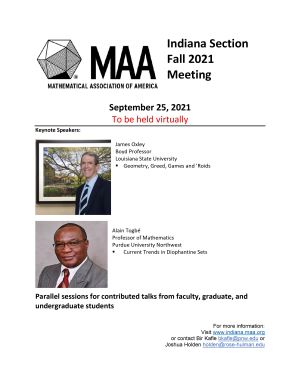Due to current COVID conditions, the Fall 2021 Section Meeting of the Indiana MAA will take place VIRTUALLY on Saturday, September 25, 2021. Click on the image below to view a pdf version of the poster for the event.
schedule and abstracts
The schedule for this meeting (as of 9/24/21) and abstracts for all of the mathematical sessions are posted below.
REGISTRATION
Registration is now closed. All registered participants were emailed a Zoom link for the meeting on Thursday, September 23rd.
Plenary speakers
James Oxley, Boyd Professor, Louisiana State University
Title: Geometry, Greed, Games, and ‘Roids
Abstract: All who have taken a high school geometry class have seen the construction of a tangent to a circle using a compass and ruler. But, can it be done without using a compass? Now suppose you want to find the cheapest way to connect a set of towns by a rail system. Can you find the answer quickly? Finally, suppose Destroyer and Constructor are playing a game on a connected network, moving alternately. Each of Destroyer’s moves obliterates a link, while each of Constructor’s moves makes a link indestructible. When can Constructor prevent Destroyer from breaking the network into pieces? This talk will answer these three questions and will discuss a common mathematical framework underlying them.
Alain Togbe, Professor of Mathematics, Purdue University Northwest
Title: Current Trends in Diophantine Sets
Abstract: A set of m distinct positive integers {a1,...,am} is called a Diophantine m-tuple if aiaj + 1 is a perfect square. In general, let n be an integer, a set of m positive integers {a1, . . . , am} is called a Diophantine m-tuple with the property D(n) or a D(n)-m-tuple (or a Pn-set of size m), if aiaj + n is a perfect square. Diophantus studied sets of positive rational numbers with the same property, particularly he found the set of four positive rational numbers {1/16, 33/16, 17/4, 105/16}. But the first Diophantine quadruple was found by Fermat. That is the set {1, 3, 8, 120}. Moreover, Baker and Davenport proved that the set {1, 3, 8, 120} cannot be extended to a Diophantine quintuple. The problem of the extendibility of Diophantine m-tuples is of a big interest. During this talk, we will give a very quick history of m-tuples and discuss of the conjectures and the recent progress to solve these conjectures.
Section NEXT Discussion panel
Topic: Alternative Assessments Techniques
Discussion Leaders: Zachary Gates (Wabash College) and Nayeong Kong (IU East)
Description: Zachary Gates will discuss Standards-Based Grading, drawing from his own experiences using this in multiple courses and also sharing what he has learned from others about this method. Nayeong Kong will then share with us Mathematics Outcome Assessments via Canvas, focusing on the assessment methods used recently in an Introduction to Probability Theory course. She will share various ideas to develop the assessment methods both in the classroom and in online courses.

